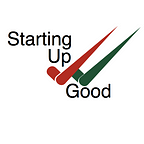Looking Ahead: Opportunities for Good as Startups Support the Next Phase of COVID-19
Written by Leah Brody
As states across the U.S. start to reopen, and “quarantine fatigue” — the unfortunate effect of extended stay-at-home orders, sunny weather, and inconsistent government directives — takes hold, it is easy to assume the worst of COVID-19 is over and we’re well on our way to recovery.
However, despite visible market gains and what is hopefully a downward slope on the infection curve, the US economic forecast remains grim, with unemployment predictions spiking up to 20% by June (a number unseen since the 1930s) and persistent rumblings of a GDP drop by up to 40% in Q2. Regardless, the gates of social isolation appear to be lifting, and we face an uncertain future that looks markedly different from years past.
As businesses enter, or prepare to enter, this next phase where we balance virus mitigation with financial recovery, they’ll need to heed the lessons learned at the pinnacle of the pandemic.
Here, we’ll explore key business considerations that have emerged over the past few months, and the distinct ways in which startups are poised to support while delivering on social impact objectives.
Formalizing Business Continuity Plans
Business continuity planning, once the universally un-checked box on C-Suite To-Do lists, has taken center stage. In a business continuity survey distributed in early March by research and advisory company Gartner, just 12% of the more than 1,500 respondents believed their businesses to be highly prepared for the impact of coronavirus.
“This lack of confidence shows that many organizations approach risk management in an outdated and ineffective manner,” said Matt Shinkman, vice president in the Gartner Risk and Audit practice. The reasoning behind this? Risk’s inherent ambiguity; it doesn’t seem worthy of consideration until it’s too full force to respond effectively.
As companies navigate the ebb and flow of a lingering pandemic, they’ll need to be more adept in how they plan for, monitor, and evaluate risk as it relates to both their business initiatives and their social/environmental goals . This presents a multi-faceted digitization opportunity ripe for savvy startups: how can companies best mitigate risk while continuing to meet the needs of their local and global communities?
Prioritizing Supply Chain Management
COVID-19 has caused major supply chain disruption, impacting everything from consumer demand to materials and delivery, and leaving procurement teams reactive and imprudent in their immediate response. According to a recent PwC survey of finance leaders in the U.S. and Mexico, 31% indicated supply chain issues as one of their top three concerns related to the COVID-19 outbreak.
However, companies that invested in and prioritized supply chain mapping prior to the pandemic have emerged successful, with better visibility into where current, and anticipated, interference lies. Still, despite its value, supply chain mapping remains an arduous, costly process that companies struggle to address.
As businesses pause to evaluate their go-forward priorities, we anticipate they’ll pay considerable attention to not only how their supply chain is managed, but what it’s made of. Startups working to simplify, modernize, and expedite the supply chain process, while ensuring trace-ability, sustainability, and fair/ethical treatment of workers within the supply chain, will be in high demand.
Embracing Business Model Adaptability
As we’ve discussed in earlier articles, startups inherent adaptability has enabled many of them to quickly pivot their offerings in the wake of COVID-19.
“Small businesses are really great at staying nimble,” said Laura Huang, associate professor at Harvard Business School and author of “Edge: Turning Adversity Into Advantage.” “This is something they’ve been set up to do because they’ve always had to deal with adversity in some way.”
Corporations are taking note, and while many have successfully shifted business operations seemingly overnight, they’ll be tasked with transitioning this newfound flexibility from the exception to the norm. Successful startups, that have built this practice into their DNA, will serve as best-in-class examples moving forward as companies consider updating everything from how they deliver their products to how they take care of and re-train employees as their businesses adapt to changed consumer realities.
As businesses prepare to lean into this next phase, we’re hopeful they’ll utilize the unique offerings and experiences of startups to help guide them forward, and continue to prioritize the greater good in their decision making.
We’ll continue to follow related stories and share important learnings on how COVID-19 is affecting the startup environment.
________________________________
Leah Brody has nearly ten years of nonprofit and corporate responsibility experience, specializing in program strategy and implementation, employee engagement, and communications. She is a Senior Director at Changing Our World and a consultant to StartingUpGood. Contact Leah at lbrody@changingourworld.com.
